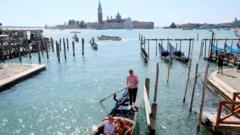In the wake of President Trump's surprising decision to impose a 20% blanket tariff on European goods, European leaders have expressed shock and concern over the ramifications for the global economy. French Prime Minister François Bayrou labeled the move a "catastrophe," signaling the beginning of a challenging period for European businesses.
**Europe Prepares for Impact of Trump's Tariffs Amid Negotiation Efforts**

**Europe Prepares for Impact of Trump's Tariffs Amid Negotiation Efforts**
European leaders brace for economic fallout from new US tariffs, while seeking a resolution.
The European Union (EU), representing its 27 member states, is gearing up to respond to the tariffs while also opening channels for negotiations. EU Trade Commissioner Maros Sefcovic aims to discuss tariff impacts with US officials soon. There is an overarching sentiment of caution as national governments scramble to reassure their industries. For instance, Italy convened an emergency summit focusing on its agrifood and wine exports to the US, while Spain’s Prime Minister Pedro Sánchez criticized the tariffs as "sterile protectionism" that ultimately harms the US.
The markets reacted negatively to the advance of a trade war; significant companies have seen their stock values tumble as uncertainty looms. Small businesses, too, are feeling the pinch, with artisanal producers like Rocco Mangiaracina's olive oil company facing uncertain futures just as they begin exporting.
Leaders across Europe warn of the severe consequences of this trade war. Slovakia, for example, expects significant economic contraction, while Italy and France anticipate losses in key sectors such as wine and spirits. The EU is preparing to retaliate with tariffs of its own, aimed at agricultural and textile goods, among others.
As negotiations unfold, it remains to be seen whether the EU can present a unified front or whether internal divisions, such as Hungary's criticisms of EU leadership, will complicate responses. The international implications of these tariffs are significant, and both sides recognize the necessity of reaching an understanding to avoid further escalation of the trade conflict.
Peter Dige Thagesen from the Danish Industry board emphasized the need for proportional responses while maintaining dialogue to prevent a detrimental trade war. As the EU prepares its counteraction strategy, the overarching hope remains for a resolution that safeguards the interests of European industries affected by the tariffs.
The markets reacted negatively to the advance of a trade war; significant companies have seen their stock values tumble as uncertainty looms. Small businesses, too, are feeling the pinch, with artisanal producers like Rocco Mangiaracina's olive oil company facing uncertain futures just as they begin exporting.
Leaders across Europe warn of the severe consequences of this trade war. Slovakia, for example, expects significant economic contraction, while Italy and France anticipate losses in key sectors such as wine and spirits. The EU is preparing to retaliate with tariffs of its own, aimed at agricultural and textile goods, among others.
As negotiations unfold, it remains to be seen whether the EU can present a unified front or whether internal divisions, such as Hungary's criticisms of EU leadership, will complicate responses. The international implications of these tariffs are significant, and both sides recognize the necessity of reaching an understanding to avoid further escalation of the trade conflict.
Peter Dige Thagesen from the Danish Industry board emphasized the need for proportional responses while maintaining dialogue to prevent a detrimental trade war. As the EU prepares its counteraction strategy, the overarching hope remains for a resolution that safeguards the interests of European industries affected by the tariffs.





















